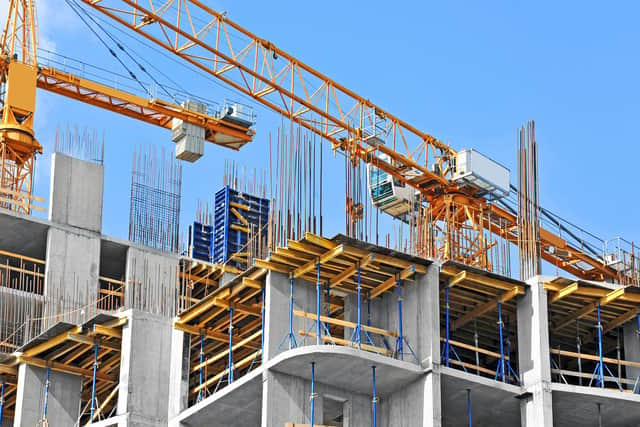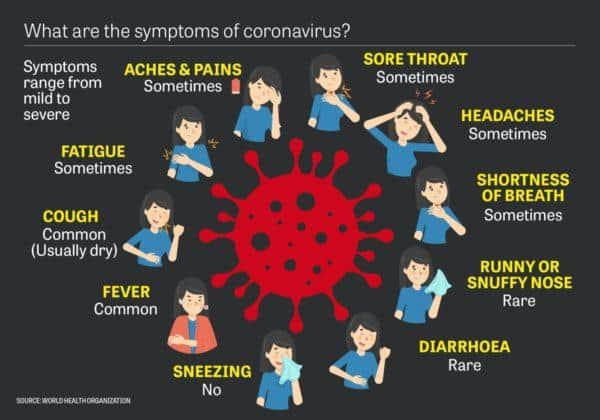Are building sites still open? Latest guidance for builders on construction site rules during lockdown
They include rules on only leaving the house for one of only four reasons:
● Shopping for basic necessities, for example food and medicine, which must be as infrequent as possible
Advertisement
Hide AdAdvertisement
Hide Ad● One form of exercise a day, for example a run, walk, or cycle - alone or with members of your household


● Any medical need, or to provide care or to help a vulnerable person
● Travelling to and from work, but only where this absolutely cannot be done from home
Can builders still go to work?
Although it was confirmed that construction sites in the UK can currently remain open, the Scottish Government continued to advise that construction sites should instead close, and First Minister Nicola Sturgeon has since said that construction should now only continue on essential projects, such as on hospitals.


Ms Sturgeon previously said: “This morning [23 Mar] I was specifically asked on the radio about building sites and hair salons, and my advice would be to close.
“I want to reiterate that if you run a business, and if the nature of your business makes it difficult for you or your workers to work from home or to practice safe social distancing, then you should close for the period of the efforts to combat this virus.
“If you are an employee, and your workplace is not abiding by this, I would urge you to speak to your employer and ask that they take action.”
However, shortly after Boris Johnson made this latest announcement, Robert Jenrick, the communities and housing secretary, tweeted that the latest advice for the construction industry was, “If you are working on site, you can continue to do so.
Advertisement
Hide AdAdvertisement
Hide Ad“I think it’s important that, when we have construction work that is going in a way that can be done safely, in the open air and on new sites, that does continue.
”It’s important that we make sure that construction and manufacturing can continue and that seems to me to be the safest way of ensuring that we can maintain appropriate social distancing rules in a way which ensures that people who cannot work from home continue to do so.”
Senior minister, Michael Gove, explained, “It is the case, as Robert Jenrick pointed out, that construction on sites should continue. People should obviously exercise sensitivity and common sense and follow social distancing measures. But construction in the open air on those types of sites can continue.”
He added, “I think it’s important that, when we have construction work that is going in a way that can be done safely, in the open air and on new sites, that does continue.
”It’s important that we make sure that construction and manufacturing can continue and that seems to me to be the safest way of ensuring that we can maintain appropriate social distancing rules in a way which ensures that people who cannot work from home continue to do so.”
Can builders go into people’s homes?
In regards to entering people’s homes, Mr Gove told ITV’s Good Morning Britain, “If it is the case you are reconstructing or building a home in which there is no one present, that is appropriate and it can go on.
“But if we’re talking about the sort of construction work that involves a builder coming into home in order to deliver an extension or something like that, that would seem not appropriate and not in line with the clear guidance.”
When then questioned about home extensions, Mr Gove added, “The construction work of the kind you have mentioned, which involves intimate contact in someone’s home, that is inappropriate.”
Coronavirus: the facts
What is coronavirus?
Advertisement
Hide AdAdvertisement
Hide AdCOVID-19 is a respiratory illness that can affect lungs and airways. It is caused by a virus called coronavirus.
What caused coronavirus?
The outbreak started in Wuhan in China in December 2019 and it is thought that the virus, like others of its kind, has come from animals.
How is it spread?
As this is such a new illness, experts still aren’t sure how it is spread. But, similar viruses are spread in cough droplets. Therefore, covering your nose and mouth when sneezing and coughing, and disposing of used tissues straight away is advised. Viruses like coronavirus cannot live outside the body for very long.
What are the symptoms?
The NHS states that the symptoms are: a dry cough, high temperature and shortness of breath - but these symptoms do not necessarily mean you have the illness. Look out for flu-like symptoms, such as aches and pains, nasal congestion, runny nose and a sore throat. It’s important to remember that some people may become infected but won’t develop any symptoms or feel unwell.
What precautions can be taken?
Washing your hands with soap and water thoroughly. The NHS also advises to cover your mouth and nose with a tissue or your sleeve (not your hands) when you cough or sneeze; put used tissues in the bin immediately and try to avoid close contact with people who are unwell. Also avoiding touching eyes, nose and mouth unless your hands are clean.
Government advice
As of Monday 23 March the prime minister has put the UK into lockdown and instructed all citizens to stay at home. People can only leave their homes to exercise once a day, go shopping for food and medication, travel for medical needs or to care for a vulnerable person, and travel to work only if essential. Police will be able to enforce these restrictions.
All non-essential shops will close with immediate effect, as will playgrounds, places of worship and libraries. Large events or gatherings of more than two people cannot go ahead, including weddings and celebrations. Funerals can only be attended by immediate family.
Children of separated parents can go between both parents' homes.
Advertisement
Hide AdAdvertisement
Hide AdAnyone with a cough or cold symptoms needs to self-isolate with their entire household for 14 days.
The government has now instructed bars, restaurants, theatres and non-essential businesses to close and will review on a ‘month to month’ basis. Schools closed from Friday 20 March for the foreseeable future, and exams have been cancelled.
The over 70s or anyone who is vulnerable or living with an underlying illness are being asked to be extra careful and stay at home to self-isolate. People with serious underlying health conditions will be contacted and strongly advised to undertake "shielding" for 12 weeks.
For more information on government advice, please check their website.
Should I avoid public places?
You should now avoid public places and any non-essential travel. Travel abroad is also being advised against for the next 30 days at least, and many European countries have closed their borders.
What should I do if I feel unwell?
Don’t go to your GP but instead look online at the coronavirus service that can tell you if you need medical help and what to do next.
Only call 111 if you cannot get help online.
When to call NHS 111
Only call NHS 111 if you can’t get help online and feel very unwell. This should be used if you feel extremely ill with coronavirus symptoms. If you have been in a country with a high risk of coronavirus in the last 14 days or if you have been in close contact with someone with the virus please use the online service.
Sources: World Health Organisation and NHS
